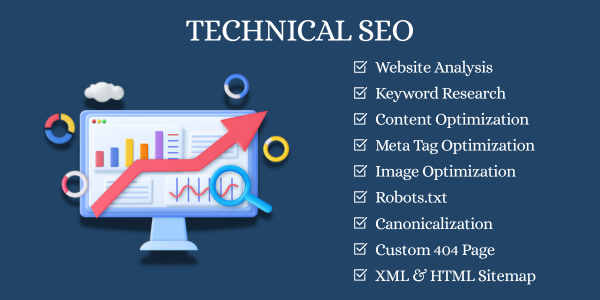In the competitive world of online marketing, having a beautifully designed website and high-quality content is only part of the equation. To truly succeed in search engine rankings, your site must also meet the technical requirements set by Google and other search engines. This is where technical SEO comes into play.
Technical SEO refers to the process of optimizing the infrastructure of your website so search engines can crawl, index, and rank it effectively. Without it, even the best content can remain hidden from your target audience. In this article, we’ll explore what technical SEO is, why it matters, and how to implement it for long-term ranking success.
Understanding Technical SEO
While on-page SEO focuses on content and keywords, and off-page SEO emphasizes backlinks and authority, technical SEO ensures that the website itself is functional, fast, and accessible. Think of it as the foundation of a building—without it, everything else collapses.
Key aspects of technical SEO include:
- Site speed and performance.
- Mobile-friendliness.
- Crawlability and indexing.
- Secure browsing (HTTPS).
- Proper use of structured data.
- Clean URL structures.
By optimizing these elements, you ensure both search engines and users can access your website seamlessly.
Why Technical SEO Is Crucial for Rankings
Search engines prioritize websites that offer great user experiences. If your site is slow, difficult to navigate, or full of errors, Google won’t rank it highly—even if your content is excellent.
Here’s why technical SEO is critical:
- Improves Crawlability: Search engine bots need to crawl your site to index it. Technical SEO ensures they can do so without obstacles.
- Boosts User Experience: Fast, mobile-friendly, and stable websites keep users engaged longer, reducing bounce rates.
- Direct Impact on Rankings: Google Core Web Vitals and mobile-first indexing directly measure technical performance.
- Prevents Penalties: Issues like duplicate content or broken links can harm rankings if not addressed.
- Supports Long-Term Growth: A technically sound website provides a stable foundation for all other SEO efforts.
In short, without technical SEO, your website cannot reach its full ranking potential.
Key Elements of Technical SEO
1. Website Speed and Performance
Site speed is one of the most important ranking factors. A slow-loading website frustrates users and increases bounce rates.
To optimize speed:
- Compress and optimize images.
- Minify CSS, JavaScript, and HTML.
- Use browser caching.
- Implement a Content Delivery Network (CDN).
- Choose reliable hosting.
Aim for a loading time of under 2.5 seconds to meet Google’s Core Web Vitals standards.
2. Mobile-Friendliness
Google uses mobile-first indexing, meaning it evaluates your site based on its mobile version. If your website isn’t mobile-friendly, your rankings will suffer.
To optimize:
- Use responsive design that adapts to all screen sizes.
- Ensure buttons and links are easily clickable.
- Avoid intrusive pop-ups that block content.
3. Crawlability and Indexing
If search engines can’t crawl your site properly, your content won’t be indexed, no matter how good it is.
Best practices include:
- Submitting an XML sitemap to Google Search Console.
- Using robots.txt to control which pages bots can access.
- Fixing crawl errors and broken links.
- Avoiding duplicate content through canonical tags.
4. Secure Website (HTTPS)
Security is a ranking factor, and users trust secure websites. Always use an SSL certificate to ensure your website runs on HTTPS. Not only does this improve rankings, but it also protects user data.
5. Structured Data (Schema Markup)
Structured data helps search engines understand your content better. For example, adding schema markup can allow your site to appear with rich snippets (reviews, ratings, FAQs) in search results. This improves visibility and click-through rates.
6. Clean URL Structure
A simple, clean URL structure improves both SEO and user experience.
Bad example:www.example.com/index.php?id_wca=85673
Good example:www.example.com/seo/technical-seo-tips
Short, descriptive, keyword-rich URLs are easier for search engines to crawl and for users to remember.
7. Fixing Duplicate Content Issues
Duplicate content confuses search engines and can dilute your rankings. Use canonical tags to tell Google which version of a page is the “official” one, and avoid publishing identical content across multiple pages.
Tools for Technical SEO
Several tools can help you audit and improve technical SEO:
- Google Search Console: Monitor indexing, crawl errors, and Core Web Vitals.
- Google PageSpeed Insights: Analyze and improve loading performance.
- Screaming Frog SEO Spider: Crawl your site to find broken links, duplicate content, and other issues.
- Ahrefs and SEMrush: Provide in-depth SEO audits and recommendations.
These tools highlight problems and suggest solutions, making technical SEO more manageable.
Common Technical SEO Mistakes to Avoid
- Ignoring mobile optimization.
- Having a cluttered, confusing site structure.
- Not using HTTPS.
- Overlooking slow-loading pages.
- Blocking important pages in robots.txt by mistake.
Avoiding these mistakes ensures that your SEO efforts produce the desired results.
How Technical SEO Supports Other SEO Efforts
Technical SEO doesn’t work in isolation. It amplifies the effectiveness of your on-page and off-page strategies. For example:
- A fast, secure website makes your content more accessible.
- A clear URL structure makes backlinks more valuable.
- A mobile-friendly design enhances social media traffic.
Agencies like mediaupshift emphasize technical SEO as a cornerstone of broader digital marketing strategies, ensuring clients not only rank well but also deliver a seamless user experience.
Conclusion
Technical SEO may sound intimidating, but it’s simply about ensuring your website is functional, accessible, and optimized for both search engines and users. By focusing on site speed, mobile-friendliness, crawlability, security, structured data, and clean URL structures, you create a strong foundation for SEO success.
Remember, search engines want to provide users with the best possible experience. A technically sound website aligns with that goal, helping you achieve higher rankings, more traffic, and stronger conversions.
If you want to future-proof your digital presence, investing in technical SEO isn’t optional—it’s essential.
 WhatsApp Us Now
WhatsApp Us Now






